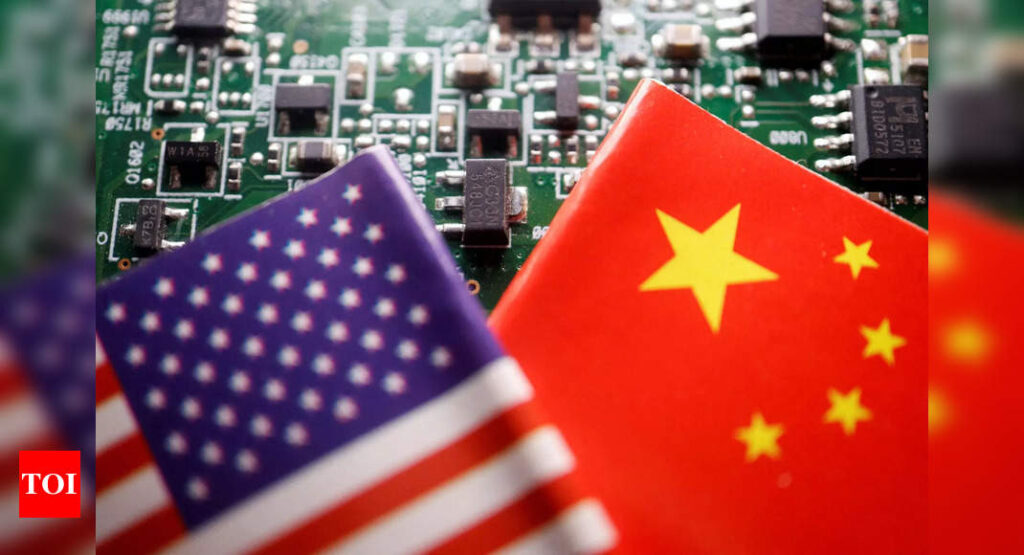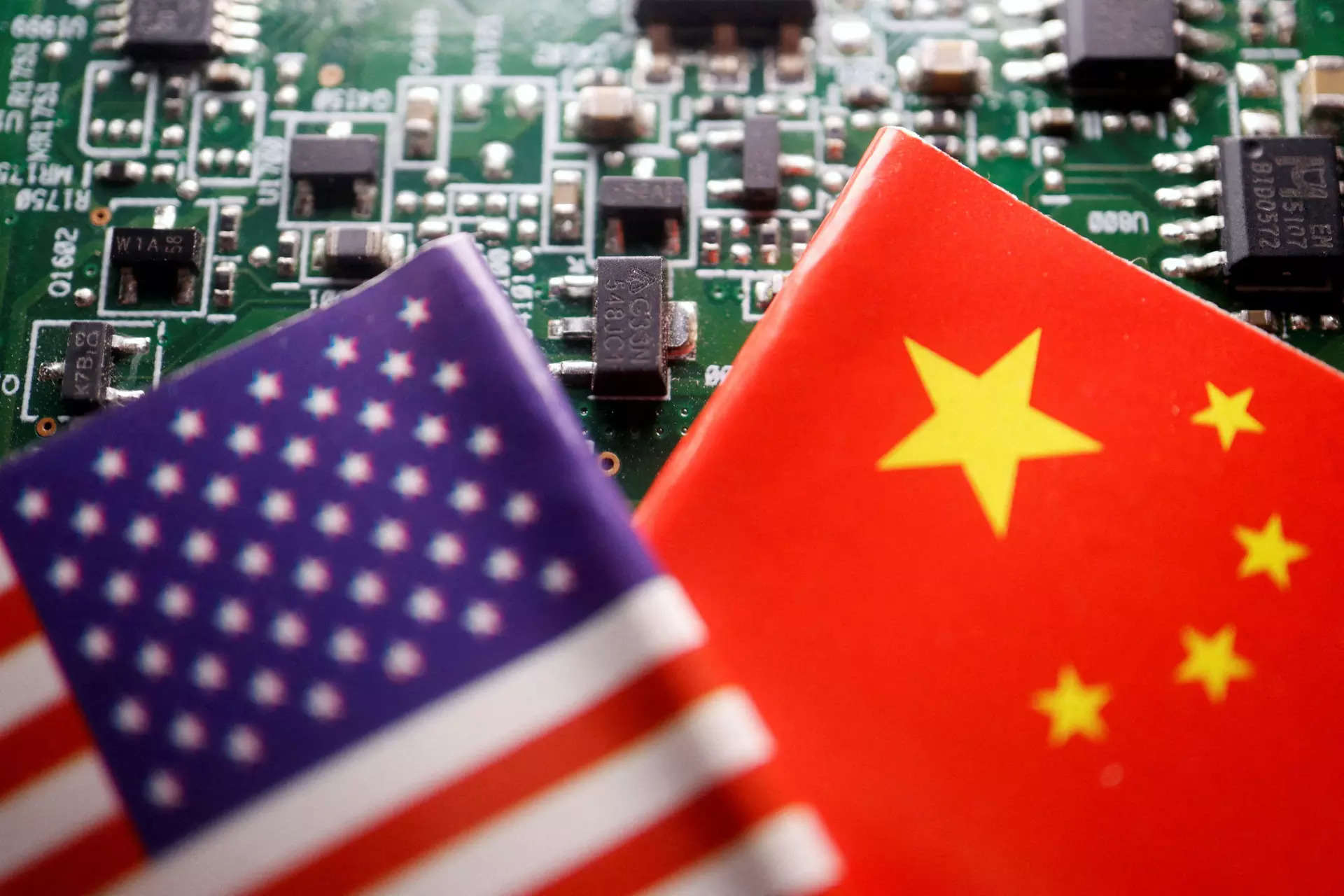[ad_1]
WASHINGTON: The US plans to tighten sweeping measures to restrict China’s access to advanced semiconductors and chipmaking gear, seeking to prevent its geopolitical rival from obtaining cutting-edge technologies that could give it a military edge.
The latest rules aim to refine and close loopholes from curbs announced last October, according to people familiar with the matter. The Biden administration is seeking to strengthen controls on selling graphics chips for artificial intelligence applications and advanced chipmaking equipment to Chinese firms, the people said, asking not to be named because the rules aren’t yet public.
The US will also impose additional checks on Chinese firms attempting to evade export restrictions by routing shipments through other nations, and add Chinese chip design firms to a trade restriction list, requiring overseas manufacturers to gain a US license to fill orders from those companies.
The US unveiled the original chip restrictions a year ago in an aggressive attempt to curtail China’s technological development, a step the Biden administration argued is necessary for national security. China has bristled at the restrictions and accelerated investments in building its own domestic capabilities.
The updated restrictions will be published early this week, people familiar with the deliberations said. A spokesman for the National Security Council declined to comment, as did a spokeswoman for the Commerce Department’s Bureau of Industry and Security.
Chip-related stocks fell in Asia after Bloomberg’s report on the latest restrictions. In Japan, Tokyo Electron Ltd, Advantest Corp and Disco Corp all fell at least 4%, while South Korean stocks such as Hana Micron Inc also slid.
The Biden administration has drawn criticism because of perceived shortcomings in the original export controls. The US unveiled the original restrictions before getting the support of key allies, notably the Netherlands and Japan, which allowed chip equipment companies in those countries to continue selling advanced gear to Chinese customers.
That helped facilitate China’s progress in developing its domestic tech capabilities. Huawei Technologies Co, a Chinese telecommunications giant at the heart of US-China tensions, quietly introduced a new smartphone in August powered by an advanced, 7-nanometer processor. A teardown of the phone revealed the chip was produced by a Chinese company, demonstrating manufacturing capabilities well beyond where the US had sought to stop its advance.
The achievement cast doubt on Washington’s ability to thwart Beijing’s technological ambitions, and spurred political pressure for the Biden administration to impose more sanctions on Huawei and its chipmaking partner, Semiconductor Manufacturing International Corp. The US has begun a formal investigation into the Huawei phone. Any resulting restrictions on Huawei or SMIC would be a separate process from the new export control rules.
“While the Huawei phone is not itself a major national security issue for the United States, what the chip inside signals about the state of the Chinese semiconductor industry absolutely is,” Gregory Allen, director of the Wadhwani Center for AI and Advanced Technologies at the Center for Strategic and International Studies, wrote in a report this month. “These advanced chip production capabilities will inevitably be made available to the Chinese military if they have not been already. Thus, the Huawei and SMIC breakthrough raises many tough questions about the efficacy of the current US approach.”
The latest rules aim to refine and close loopholes from curbs announced last October, according to people familiar with the matter. The Biden administration is seeking to strengthen controls on selling graphics chips for artificial intelligence applications and advanced chipmaking equipment to Chinese firms, the people said, asking not to be named because the rules aren’t yet public.
The US will also impose additional checks on Chinese firms attempting to evade export restrictions by routing shipments through other nations, and add Chinese chip design firms to a trade restriction list, requiring overseas manufacturers to gain a US license to fill orders from those companies.
The US unveiled the original chip restrictions a year ago in an aggressive attempt to curtail China’s technological development, a step the Biden administration argued is necessary for national security. China has bristled at the restrictions and accelerated investments in building its own domestic capabilities.
The updated restrictions will be published early this week, people familiar with the deliberations said. A spokesman for the National Security Council declined to comment, as did a spokeswoman for the Commerce Department’s Bureau of Industry and Security.
Chip-related stocks fell in Asia after Bloomberg’s report on the latest restrictions. In Japan, Tokyo Electron Ltd, Advantest Corp and Disco Corp all fell at least 4%, while South Korean stocks such as Hana Micron Inc also slid.
The Biden administration has drawn criticism because of perceived shortcomings in the original export controls. The US unveiled the original restrictions before getting the support of key allies, notably the Netherlands and Japan, which allowed chip equipment companies in those countries to continue selling advanced gear to Chinese customers.
That helped facilitate China’s progress in developing its domestic tech capabilities. Huawei Technologies Co, a Chinese telecommunications giant at the heart of US-China tensions, quietly introduced a new smartphone in August powered by an advanced, 7-nanometer processor. A teardown of the phone revealed the chip was produced by a Chinese company, demonstrating manufacturing capabilities well beyond where the US had sought to stop its advance.
The achievement cast doubt on Washington’s ability to thwart Beijing’s technological ambitions, and spurred political pressure for the Biden administration to impose more sanctions on Huawei and its chipmaking partner, Semiconductor Manufacturing International Corp. The US has begun a formal investigation into the Huawei phone. Any resulting restrictions on Huawei or SMIC would be a separate process from the new export control rules.
“While the Huawei phone is not itself a major national security issue for the United States, what the chip inside signals about the state of the Chinese semiconductor industry absolutely is,” Gregory Allen, director of the Wadhwani Center for AI and Advanced Technologies at the Center for Strategic and International Studies, wrote in a report this month. “These advanced chip production capabilities will inevitably be made available to the Chinese military if they have not been already. Thus, the Huawei and SMIC breakthrough raises many tough questions about the efficacy of the current US approach.”
[ad_2]
Source link











More Stories
India’S Growth Forecast: S&P ups India’s FY’24 growth forecast to 6.4% on robust domestic momentum
India to remain fastest-growing major economy, but demand uneven: Poll
Jack Ma: Jack Ma gets back into business with ‘Ma’s Kitchen Food’